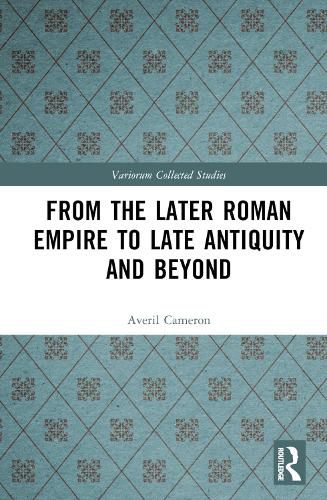Readings Newsletter
Become a Readings Member to make your shopping experience even easier.
Sign in or sign up for free!
You’re not far away from qualifying for FREE standard shipping within Australia
You’ve qualified for FREE standard shipping within Australia
The cart is loading…






Averil Cameron is one of the leading historians of late antiquity and Byzantium. This collection (Cameron's third in the Variorum series) discusses the changing approach among historians of the later Roman empire from the 1960s to the present and the articles reproduced have been chosen to reflect both these wider changes in treatments of the subject as well as Cameron's own development as a historian over many decades. It provides a revealing and important survey of some profound historiographical changes.
Her volume contains fundamental papers and reviews that tell a story in which she has played a leading part. They move from her early days as an ancient historian to her important contribution in the establishment of the field of late antiquity and point to her later work as a Byzantinist, a trajectory rivalled by few other scholars.
The book will be important for scholars and students of the later Roman empire and late antiquity, and for anyone interested in the inheritance of Edward Gibbon, the perennial questions about the end of the Roman empire and its supposed decline, or the emergence of Islam in the early seventh century and its relation to the late antique world. (CS 1113).
$9.00 standard shipping within Australia
FREE standard shipping within Australia for orders over $100.00
Express & International shipping calculated at checkout
Averil Cameron is one of the leading historians of late antiquity and Byzantium. This collection (Cameron's third in the Variorum series) discusses the changing approach among historians of the later Roman empire from the 1960s to the present and the articles reproduced have been chosen to reflect both these wider changes in treatments of the subject as well as Cameron's own development as a historian over many decades. It provides a revealing and important survey of some profound historiographical changes.
Her volume contains fundamental papers and reviews that tell a story in which she has played a leading part. They move from her early days as an ancient historian to her important contribution in the establishment of the field of late antiquity and point to her later work as a Byzantinist, a trajectory rivalled by few other scholars.
The book will be important for scholars and students of the later Roman empire and late antiquity, and for anyone interested in the inheritance of Edward Gibbon, the perennial questions about the end of the Roman empire and its supposed decline, or the emergence of Islam in the early seventh century and its relation to the late antique world. (CS 1113).